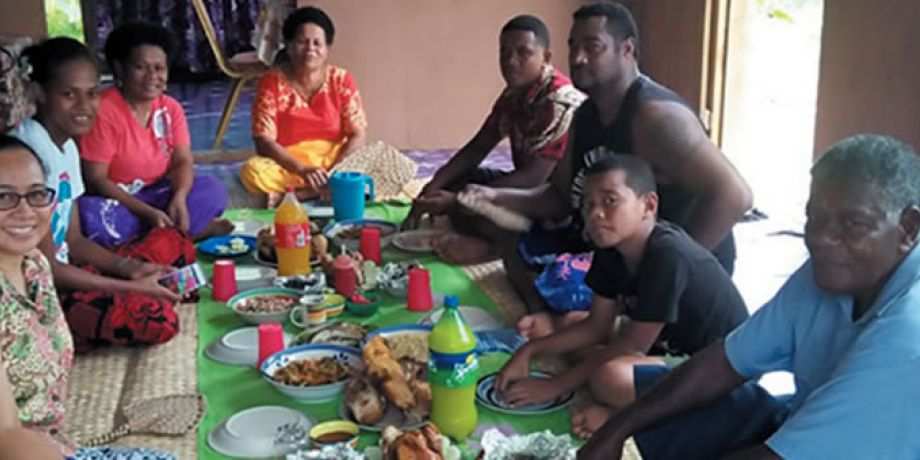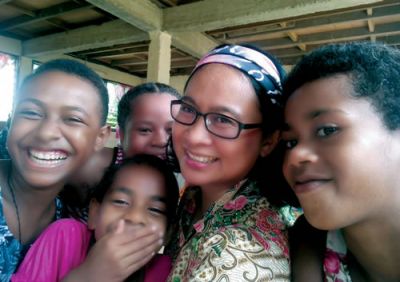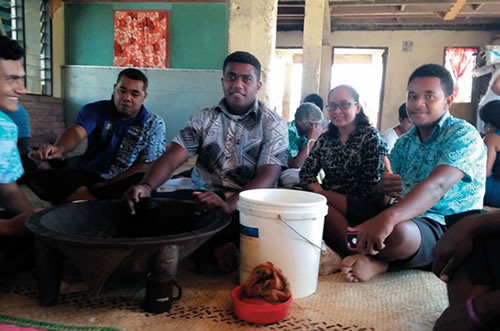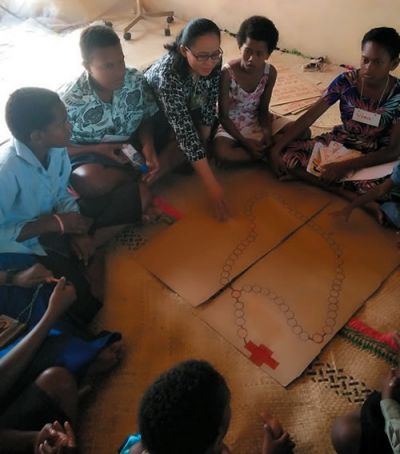
Light from the Dark
Na yacamu? Na yacaqu, O Jinky mai, Philippines. What is your name? This is the common question I used to hear and the common answer I used to say every time I meet people in the village of Navatuyaba, Toga, in Rewa province Fiji where I am having my exposure for language and culture. Answering this question is like telling the story of myself.

I am a first term Columban lay missionary here in Fiji. As a missionary, my first ministry is to learn the language and culture of the people. Inquiring also about their name at the beginning of our encounter is my initial step to befriend them. It is very confusing to me sometimes to remember their names in just one meeting, because the same names are frequently passed to the members of the family or community. So I meet people with similar names and sometimes similar faces. If you are named after your auntie or uncle, it is understood as a great honor and responsibility because what you give and receive is not only a name but the quality of life you live.
In the village, I am known as a missionary from a faraway land. I bear this name like a mark wherever I go and whatever I do. This mark gives meaning and purpose to my experience of living with the people. Prior to joining the Columban lay mission program, I used to live and work in Manila, Philippines, as an educator in one of the private schools run by the religious Sister or the Franciscan Missionaries of Mary.
Just imagine the life and the stress in living and working in a congested environment where people used to leave from the office in a hurry to avoid the hustle and bustle of congested roads due to traffic jams or staying up late because of too much work to accomplish. That was my world, and it was moving very fast. I kept catching up and then watching the time speed up right before my eyes. Then, the Lord plucked me out from that kind of life and put me in a place where I need to slow down, calm my spirit and just enjoy speaking and listening to the people whose culture and ways of life are totally different from mine.

I stay with one Fijian family in the village. I wake up early at six in the morning to join the morning prayer with the Vakavuvuli, or catechist, in the village and some other Catholics who say their prayers in the church before going to their work and duties. In the morning you will hear people greeting each other “yadra!” with a big smile on their faces. It is a shortened form of saying “Good morning!” This little gesture every morning gives me a sense of peace and joy as I welcome each new day. After a small exchange of greetings and conversation, we take our morning tea with bread and do our household chores. Sometimes, I go along with my mother in the village to get shells and catch fish in the river and get ota, a wild fern in the bush, for our dish. Then, I also go and join whenever there are meetings or parish youth activities. My mother brings me to the different occasions in the village as well as in the parish for me to have a better understanding and experience of the culture, language and faith of the people. I had the opportunity to attend celebrations like weddings, birthday parties, welcoming a newborn child, funerals, family gatherings, different meetings and gatherings of youth, men and women of other faiths, and even drinking yaqona, their traditional drink. Then on Sundays, I do the Sunday Gospel Catechesis with the children and the Marian Catechesis during their holidays.

In the beginning, I just observed and listened to the people though I could not understand their language. I wanted to speak or join in their conversation and laugh with them too but the only thing that I could do is to smile and say “Bula!” which means hello, “Moce!,” or goodbye, and “Vinaka Vakalevu,” thank you very much!” Having heard people speaking the Bauan, their national language, sometimes I feel frustrated because I hardly understand them and I felt I am so was so slow to learn. It is like I am a child again, learning to talk, to eat, to crawl and to stand and always told what to do and say. Indeed, learning the language takes time with lots of humility and patience in your bucket. There were times I asked myself why am I doing this? Why I am here trying hard to speak what the people are speaking, eat what they eat, dress how they dress and more? But the answers to these questions amazed me as I slowly learn to speak the language and do away with my judgments and prejudices. It is like seeing light in the dark!
The things I have done, and the words I have heard and spoken bring me into a deeper meaning and purpose when I slowly learn to embrace their culture and ways. These realizations slowly transformed me and helped me to see the beauty and wonder of the people whom I talk to and live with. I learned to appreciate the beauty of their culture when I am able to understand what they are trying to express. I am beginning to appreciate the beauty of their songs and prayers, their music, their food, their language, their expression of faith and unity, their values and culture. Indeed, I am beginning to feel at home!
What I like most about the people in the village is their welcoming attitude. For me, their way of greeting somebody “Bula!” with matching handshake is something meaningful. Bula is just more than saying “hello.” It also means life. The handshake is a simple gesture that would connect you to the person. It is like an offering of friendship and sharing of one’s sacred life. I remember what Jesus said in John 10b:10, “I have come that they may have life, and that they may have it more abundantly.” It is the “Bula” of Jesus, His initiative to make friends with us wanting to share His love and joy in its fullness. I realized that my mission here is not only sharing my life with the people of God in Fiji but most of all I find it more like encountering Christ Himself in the life of others, sharing life with Him and growing in faith, joy and love with Him and being vulnerable before Him. It is an experience of becoming one with the people by sharing their joys and struggles every day and discovering what God has been doing in their faith-life journeys.
The big challenge that I encountered in the village which is still a challenge for me is the drinking of kava which is also known as yaqona. It comes from the root of the yaqona (piper methysticum) bush. The root is ground up and then strained with water that when you drink, it numbs your mouth, tongue and lips and gives you a sense of relaxation. For me, it is a challenge because it looks like I am drinking bland, murky water. So, I told myself that I have to drink it because they say that it is the best university for learning the language. Yaqona drinking is an avenue for the people in the village to come together, exchange jokes and share stories. So when it is my turn to drink, I take the cup and in silence I pray, “Jesus, this cup is for you, cheers!” until I find myself enjoying not only the drinking of yaqona, but also the presence of the people around the tanoa, a round bowl used by the Fijians to mix their drink. I thought that if Jesus would have been like a Fijian, He might also have mixed and drank yaqona and told His parables around the tanoa. Sharing a drink from one cup is more than just mere drinking but is an expression of unity and friendship. I would say that is a new form of the “table fellowship” of Jesus. From this experience I have learnt the important meaning of the mutual sharing of the gift of my time spent together and listening to some sacred stories where mutual evangelization takes place. Indeed, each one has a gift to share and offer which can make a difference into the lives of one another.
I realized that the best gift that I can offer is my gift of presence with my time and heart and ears to listen. Just by simply being myself and dealing with others with sincerity of heart help me to develop relationships that are built on mutual trust and respect. This kind of experience with the people gives me a glimpse of what mission is all about. As I continue my journey, I believe that God who has called me will always amaze me with new learning experiences and continue to transform my heart. Today, I can say from my heart that I am home in Fiji! Cheers for Christ! To Him be the glory!
Columban lay missionary Evangeline “Jinky” Ucol lives and works in Fiji.